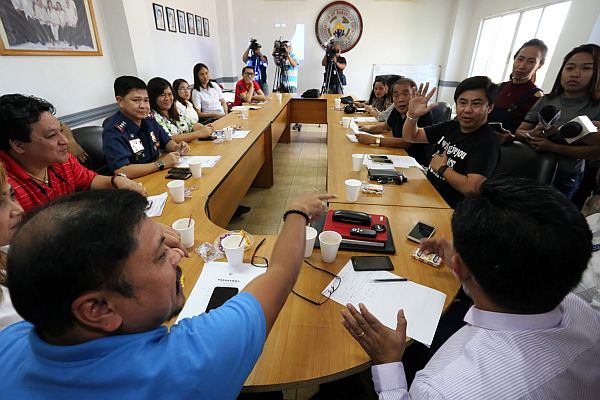
The Commission on Human Rights in Central Visayas (CHR-7) called five barangay captains to a meeting on Wednesday together with officials of the Cebu City Police Office (CCPO), Philippine Drug Enforcement Agency (PDEA-7), Department of Interior and Local Government (DILG-7) and the Cebu City Office for Substance Abuse Prevention (Cosap) to find a win-win solution to the barangays’ anti-drug campaigns which involved the posting of notices on homes.
(CDN PHOTO/JUNJIE MENDOZA)
IF elected officials are prohibited by the Commission on Human Rights in Central Visayas (CHR-7) from posting anti-drug notices on houses, would it be okay if the homeowners do it themselves?
Such was the proposal of barangay captains who were called by CHR-7 to a meeting on Wednesday, in hopes of finding a win-win solution to the village officials’ anti-drug policies which had human rights advocates crying foul as they viewed the measures to be discriminatory.
“Give us time to analyze the legal implications of the proposal. We need to fine-tune everything,” said CHR-7 Director Arvin Odron during the two-hour meeting with barangay officials and law enforcement agencies at the Association of Barangay Councils (ABC) Cebu City office at the South Road Properties.
“In the meantime, all anti-drug policies of barangays are held in abeyance. We have to be careful. We want to ensure that human rights are protected,” Odron added.
While the CHR-7 had yet to make a formal stance on the matter, ABC Cebu City President Philip Zafra agreed to temporarily suspend all anti-drug policies in the city’s villages, including the controversial posting of drug-free stickers in Barangay Ermita.
Posting drug-free stickers or labeling suspected drug dens violates the dignity of persons are tagged of something without due process of law, said Odron.
“Let the Department of Justice prosecute. Let the courts convict, and the Bureau of Corrections rehabilitate. In the anti-drug programs being implemented, it’s as if we convict a person without due process of law,” Odron explained.
“No matter how good your intention is, if what you are doing is not in accordance with the law, then that’s nothing. Let us follow the law. We are a government of laws, not of men,” he added.
Held in abeyance
Present during the meeting were Zafra, Ermita Barangay Captain Felicisimo Rupinta, Poblacion Pardo Barangay Captain Althea Lim, Binaliw Barangay Captain Wilson Bacor and Barangay Captain Junard Chan of Pajo, Lapu-Lapu City.
Chan agreed to stop, in the meantime, his spray-painting campaign which aimed to distinguish drug dens from drug-free homes in their village; while Rupinta, who recently posted drug-free stickers on over a thousand homes in Ermita, explained that they just wanted to let the public know that not all homes in the village were into illegal drugs.
“Every day, about 1,000 people visit our barangay to use illegal drugs. We don’t want people to think that everyone in our place is involved in illegal drugs,” Rupinta explained while he also agreed to temporarily stop their anti-drug program if only to protect village officials from any case that may be filed against them by CHR.
“Before, we were suspended for allegedly not doing anything to fight illegal drugs. Now, we might be suspended again this time for doing something against illegal drugs,” Rupinta quipped, referring to a six-month suspension imposed by the Office of the Ombudsman against him and all seven Ermita barangay councilors last February for their failure to cooperate with a drug raid in November 2016.
For his part, Chan, who earlier adopted a shame campaign in Barangay Pajo, said he and his constituents badly want to end the drug problem in their place.
“It was my constituents who asked me to implement the campaign,” he said, alluding to his program where houses were spray-painted with the message “Identified drug den area,” and later, posting signs that read, “Balay puloy-anan, dili suyopanan (This is a house, not a drug den)” on drug-free homes.
During the meeting, Chan wore a black shirt with the message “I will give you a chance to change.” On the shirt’s back was printed “Let’s make Barangay Pajo drug-free.”
Cebu City police director Senior Supt. Joel Doria, lawyer Ana Lynn Hernandez, officer in charge of the Philippine Drug Enforcement Agency in Central Visayas (PDEA-7), PDEA-7 spokesperson Leia Albiar, Cebu City Office for Substance Abuse Prevention (Cosap) head Garry Lao and Emma Joyevelyn Calvo of the Department of Interior and Local Government (DILG) Cebu City also attended the gathering.
Express yourself
Barangay Captain Bacor suggested that stickers posted on homes could read, “This family supports a drug-free community.”
The message, Bacor said, was not discriminatory as opposed to other signs placed in Barangays Ermita in Cebu City, and Pajo in Lapu-Lapu which tagged “drug-cleared” houses and suspected drug dens.
CHR-7 chief investigator Leo Villarino, who also attended the meeting, believed that there was nothing wrong with Bacor’s suggestion provided that the residents themselves or the individual households post the stickers, not the barangay officials.
Zafra proposed that barangay officials could help find ways to fund the program if residents could not afford to pay for anti-drug stickers or tarpaulins.
Odron explained that CHR-7 decided to meet with barangay officials, not to go against each other but to find ways to address public concerns on the implementation of some anti-drug programs.
“This is not an adversarial meeting. We just have to make sure that human rights are upheld in every program being implemented,” said Odron, adding that human rights are “supreme, inherent and alienable rights to life, to dignity and to self development.”